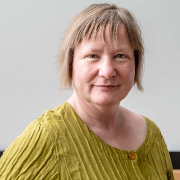Back in March 2023, Professor Wiebke Arlt chaired the outline application panel for the first round of Medical Research Council Centres of Research Excellence (MRC CoRE) selections. Then earlier this year, in January 2024, she chaired the interview panel.
As this is a new type of MRC funding for major investments, here we provide insights into the three-stage application process. We hope these help the community navigate future application rounds.
1. The outline application stage
Professor Wiebke Arlt
First, we asked people to submit an outline application that was looked at by all panel members and myself, as the chair. There were 20 people on the round one panel. This included people with subject expertise in the advertised topic areas for the first round of the competition. Also those with high-level strategic views on MRC investment, drawn from the MRC major investments board.
We discussed these outline applications one by one. Then at the end of the two-day shortlisting panel, we agreed on those applications that were taken forward to full application stage. Importantly, we decided to only take forward a small number of applications that we felt had a realistic chance of getting funding.
The outline application needs to address an important but also a succinct challenge. This challenge should be ambitious but realistic to solve in the 14-year funding period. Many outlines were just too broad in their scope and couldn’t argue sufficiently that they would be able to solve the challenge. Applications fared better by putting a focus on a specific area and then describing how they would solve a related challenge.
It is important to scan the national and international landscape. Think about who do you need to really address this challenge in an integrated, cutting-edge approach? It’s not mandatory to have people from other universities, if you feel you can cover all the bases without one institution. But collaboration, in particular across disciplinary boundaries, can be helpful. Consider who else is working in a similar area so that you can convey how what you propose is different.
Dr Ceri Williams
There are four assessment criteria at the outline stage:
- the potential of the research challenge
- the approach taken to address the challenge
- the research environment
- the capability of the team to deliver
The outline application needs to make clear what is new in terms of the approach to research. How will it lead to transformative impact? What is the added value of tackling the challenge through the MRC CoRE model rather than other funding routes?
A proposed MRC CoRE must have potential to be either an international centre of excellence in the challenge or a centre of exceptional national strategic importance. Outlines should demonstrate the excitement of the research challenge and the potential to fully meet all criteria to be invited to proceed.
2. The full application stage
Wiebke
There were fewer applications at this stage and the decision to take them forward to interview was made solely on quality. We needed to see evidence of excellent science, science that has the potential to be transformative in the chosen area.
And we wanted to see an integrated team approach to tackle the science. The best applications described how they would achieve the challenge as a team, drawing on the expertise and input of everyone involved. They had thought through who would lead and what kind of leadership succession there would be.
Ceri
At this stage, we need to see detailed research plans for the first few years, to give the panel confidence that you have the right initial approach. We want to understand your approach to decision-making and managing risk.
As Wiebke mentions, we also want evidence of new ways of team working and tools to create an enhanced research culture over and above institutional activities. We want to see that each team has thought out specific activities that would enhance research culture, in relation to their specific challenge and the assembled team. That includes aspects such as interdisciplinary working, equality, diversity and inclusion, and public involvement and engagement.
We are here to support teams with their approach to research culture, so please get in touch with us if you’d like to discuss ideas.
3. The interview stage
Wiebke
Don’t be intimidated by the large interview panel! I think we had close to 30 people on the panel. This included also staff from MRC head office who were in the room for the interviews.
It would be nice if people can prepare not only what they will say in the interview, but also how they will introduce each other and their roles in the project. That helps the panel see what the team members understand of each other’s roles in the project.
It was good to hear from all the team at the interview, to bring in their expertise and their perspective. This gave us a good impression of the ways of working within the team.
Ceri
Teams should be prepared to speak to all aspects of their proposal, although the interview panel will only ask questions on areas where they need more information or clarification.
Find out more
If there’s anything you’d like to discuss about the application process, please contact: core@mrc.ukri.org
For those who have been invited to apply for the full application stage of round two of funding for MRC CoREs, the closing date is 12 September 2024 at 4:00pm.
Read the pre-announcement for MRC CoRE funding round three. Round three will open for outline applications on 9 October 2024.
The first MRC CoREs are due to be announced later this year.
Read tips from Maddy Parsons, member of our MRC major investments board, on how to grow positive research culture in big research investments.






